Italian Radicals
Italian Radicals Radicali Italiani | |
|---|---|
 | |
| Abbreviation | RI |
| Leader | Emma Bonino |
| Secretary | Riccardo Magi |
| President | Antonella Soldo |
| Founded | 14 July 2001 |
| Headquarters | Via Angelo Bargoni 32-36, 00153 Rome |
| Newspaper |
Quaderni radicali Notizie Radicali Radio Radicale (FM radio) |
| Membership (2007) | 1,841[1] |
| Ideology |
Liberalism[2] Libertarianism[2] Anti-clericalism[3] European federalism[4][5][6] |
| Political position | Centre |
| National affiliation | More Europe1 |
| European affiliation | Alliance of Liberals and Democrats for Europe |
| European Parliament group | No MEPs |
| Chamber of Deputies |
2 / 630 |
| Senate |
1 / 315 |
| European Parliament |
0 / 73 |
| Regional Councils |
2 / 897 |
| Website | |
|
www | |
|
1 Part of the centre-left coalition | |
The Italian Radicals (Italian: Radicali Italiani) are a political party in Italy, which describes itself as a "liberale, liberista e libertario", where liberista denotes economic liberalism and libertario a form of cultural liberalism concerning moral issues.
From 2001 to 2017 the party intended to be the Italian section of the Transnational Radical Party (TRP), that is to say the continuation of the Radical Party founded in 1955 by the left-wing of the Italian Liberal Party and re-launched in the 1960s by Marco Pannella. As the Radical Party had become a transnational NGO working mainly at the UN-level, which by statute could not participate in national elections, its Italian members organised themselves into the Pannella List between 1992 and 1999 and the Bonino List until 2001, when they established the RI. In 2017 the TRP broke with the RI.
Founded on 14 July 2001 (with Daniele Capezzone as their first secretary), the RI are a member of the Alliance of Liberals and Democrats for Europe Party.[7] The party was previously a full member of the Liberal International.[8] According to its constitution, the party "as such and with its symbol does not take part in elections".[9]
History
Background
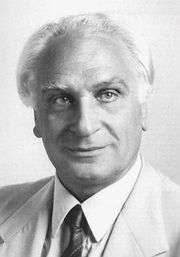
The Radical Party was long a left-libertarian movement in Italy, often proposing itself as the most extreme opposition to the Italian political establishment. When Silvio Berlusconi entered the political arena in 1994, the Radicals, who were then organised mostly into the Pannella List and were attracted by Berlusconi's proposed economic liberalism, supported him, albeit critically and without becoming directly involved in his centre-right governments, in the hope of a "liberal revolution" as opposed to the conservative and statist political establishment represented by traditional parties.
The relationship between the Radicals and Berlusconi, whose allies included socially conservative groups at odds with the Radicals' cultural liberalism, soon ended up. In the 1999 European Parliament election, the Bonino List obtained 8.7% of the vote and seven MEPs, including Emma Bonino, Marco Pannella, Marco Cappato and Benedetto Della Vedova. However, the Radicals were not able to convert that electoral success into a more stable political influence.
Road to the new party
Shortly after the 1999 election, they deserted Berlusconi's proposal of welcoming them back into the centre-right fold and instead formed the Committee of Radicals for the Liberal Revolution and the United States of Europe, led by Cappato. In the run-up of the 2000 regional elections, the opposite happened: Berlusconi's conservative allies posed a veto on the Radicals, who wanted to re-compose the alliance. Consequently, they ran independent bids in most regions, obtaining elects only in Piedmont and Lombardy.
In 2001, after a crushing defeat in the general election (only 2.3% of the vote and no seats), they re-organised themselves as Italian Radicals and elected 28-year-old Daniele Capezzone as secretary and Della Vedova, Rita Bernardini and Luca Coscioni as joint presidents.
In the run-up to the 2005 regional elections, the Radicals understood that their isolation was no longer sustainable and took the unprecedented step of contextually asking to join either the centre-right House of Freedoms or the centre-left The Union regardless of their respective political platforms. but the request was turned down by both.
The Rose in the Fist
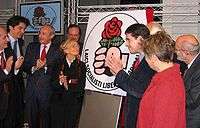
In November 2005, the Radicals formed an alliance with the Italian Democratic Socialists (SDI),[10] becoming de facto members of The Union coalition for the 2006 general election. The "rose in the fist", the symbol of the Socialist International (which included the SDI) which the Radical Party bought from the French Socialist Party, was chosen for the joint list that was thus named Rose in the Fist (RnP). This decision led those Radicals who were more keen on an alliance with the centre-right to split: this group, led by Della Vedova, launched the Liberal Reformers and joined the House of Freedoms, eventually merging into Berlusconi's Forza Italia.
In the election, the list won a mere 2.6% of the vote, much less than the combined support for the two parties before the alliance (the Radicals alone got 2.3% in the 2004 European Parliament election). The Radicals lost voters in their strongholds in the North to Forza Italia, while the Socialists lost ground in their southern heartlands to The Olive Tree parties (see electoral results of the RnP). After the election, Bonino was sworn in as Minister of European Affairs and International Trade in the Prodi II Cabinet.
In November 2006, after a row with Pannella, who was still the party's real leader, Capezzone was forced not to run again for secretary and was replaced by rank-and-file Bernardini. Since then, although not leaving officially the party, Capezzone became very critical of the government and formed his own political association named Decide!, much closer to the centre-right than to the centre-left. Later on, Capezzone entered Forza Italia and became the party's spokesman.
In November 2007, the RnP was disbanded as the SDI merged with minor Socialist parties to form the modern-day Italian Socialist Party and the Radicals were at a new turning-point of their history. In the run-up of the 2007 congress, Pannella declared that the party should "give absolute priority to economic, liberal and libertarian reforms rather than the civil struggle to Vatican power, prepotency and arrogance", which had been central in 2006.[11][12] This did not mean a reconciliation with the centre-right.
Within the Democratic Party
In the 2008 general election, the Radicals stood for re-election in list with the Democratic Party (PD). Under an agreement with PD's leader Walter Veltroni, six deputies and three senators were elected. After the election, Bonino was appointed Vice President of the Senate and the Radicals joined the PD's parliamentary groups. In June, Bernardini, Maria Antonietta Coscioni and Elisabetta Zamparutti (all three elected MPs) were replaced by Antonella Casu, Bruno Mellano and Michele De Lucia as secretary, president and treasurer, respectively.[13] In November, the new leadership was confirmed by the national congress.[14]
In the 2009 European Parliament election, the Radicals ran separately from the PD as the Bonino-Pannella List. Having obtained 2.4% of the vote, they failed to return any MEPs. In November, Mario Staderini replaced Casu as secretary.[15]
Bonino ran for President of Lazio for the centre-left coalition in the 2010 regional election, but was defeated by Renata Polverini.
Out of Parliament
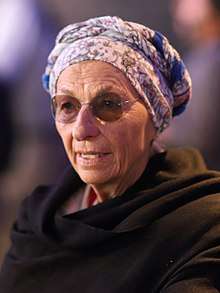
In January 2013, the party announced that it would contest the upcoming general election on a stand-alone electoral list called Amnesty, Justice and Freedom (Aministia, Giustizia, e Libertà).[16][17] In the election, the party received 0.2% of the vote, returning no deputies and senators.[18][19] However, in April and after two months of failed attempts at forming a new government, thanks to her international standing and Pannella's lobbying efforts, Bonino was sworn in as Minister of Foreign Affairs in the Letta Cabinet. The cabinet lasted until 22 February 2014, when it was replaced by the Renzi Cabinet, which did not include Bonino.
In November 2013, the party elected a new leadership: Bernardini secretary, Laura Arconti president and Valerio Federico treasurer.[20] The party did not take part in the 2014 European Parliament election, partly due to lack of funds.
In November 2015 during the annual party congress, Riccardo Magi was elected secretary and Cappato president. Pannella, who did not speak at the congress, opposed the change while Bonino, who was no longer in good terms with the old leader, did not even take part in the congress.[21][22][23][24] However, in the following months Bonino decided to side with Magi and Cappato, who launched "Radical" lists for the 2016 municipal elections in Rome and Milan, in a move opposed by the leadership of the TRP, especially Maurizio Turco.[25][26] The lists obtained 1.2%[27] and 1.9%,[28] respectively and in both cases supported the candidates put forward by the PD, either in the first or the second round.
Pannella's death and split
In May 2016, Pannella, who had long suffered from cancer, died and Italian politicians from across the entire political spectrum paid tribute to him.[29][30]
In the event, the party found itself increasingly divided in two factions: on one side Magi, Cappato and Staderini (who were backed by Bonino), on the other Turco, Bernardini and most of the staff of Radio Radicale (who were closer to the late Pannella). The former focused more on Italian politics and elections, while the latter were more interested in the activity of the Transnational Radical Party (TRP) and no longer in playing an active role in elections (as suggested by Pannella).[31][32]
The fracture was evident in September 2016 at the congress of the TRP, during which the faction of Turco and Bernardini soundly beat the other wing.[33][34][35][36] At the November 2016 congress, in turn the RI confirmed Magi as secretary while electing Antonella Soldo as president.[37][38]
In February 2017, the TRP severed its ties with the RI (who were accused of boycotting the TRP) and the latter were forced out of the Radical headquarters.[39][40][41][42][43]
Return to Parliament
In November 2017 the RI formed, along with Della Vedova's Forza Europa (FE) and some members of the Civics and Innovators (CI), More Europe (+E), a pro-Europeanist list for the 2018 general election, led by Bonino.[44][45][46] +E was part of the centre-left coalition led by Matteo Renzi and the PD.
The list won 2.6% of the vote in the election, falling short of the 3% threshold, but Bonino was elected to the Senate in a single-seat constituency in Rome, Magi to the Chamber also from Rome and Alessandro Fusacchia from the European constituency of Italians abroad. Contextually, the list obtained 2.1% and one regional councillor in the Lombard regional election and 2.1% and one regional councillor also in the 2018 regional election.
Ideology
According to the party statute,[47] the Italian Radicals are both a "liberal, liberist and libertarian" party and a non-ideological, pragmatic and open movement: indeed the RI are the only Italian political movement who consent the double membership.
The RI claims the legacy of Risorgimento radical-republican figures such as Carlo Cattaneo,[48] Giuseppe Mazzini,[49] and Felice Cavallotti, and 19th-century liberal and socialist intellectuals as Gaetano Salvemini,[50] the brothers Carlo and Nello Rosselli, Benedetto Croce,[51] and party-ideologue Ernesto Rossi.[52]. Internationally, the RI political though is influenced by ideas of Martin Luther King, Mahatma Gandhi, Immanuel Kant and Karl Popper.[53]
On political action's methods, the RI adopts referendums as direct democratic system of vote (since 1974, the Radical Party and his not-legal successor RI had purposed more than 110 referendums, winned 35 times)[54] and Gandhi-inspired nonviolence, the Satyagraha, also adopting extreme tactics like hunger strike and, occasionally, thirst strike.[55][56] Particularly, Marco Pannella became near to the nonviolent movement after a long time association with Aldo Capitini, an anti-fascist activist nicknamed "Italian Gandhi".[57]
On fiscal issues, the Radicals are usually liberists and libertarians, supporting non-interventionist and free market policies, but in recent times accepted part of welfare state system, especially on healthcare. The Radicals are historically divided in two wings: the "Friedmanians", those who were influenced by Milton Friedman and the Chicago School, and the "Keynesians", who support neo-Keynesian or post-Keynesian economics.[58] This factions became less present after the party decline in 2010s, that adopted moderate liberal trends on economy.[59]
On social issues, RI appear as the most progressive party in Italy. The Radicals fully supports progressive stances like same-sex marriage, abortion, artificial insemination and euthanasia, vocally claiming for a advance healthcare directive (AHD).[60] On healthcare, RI support universal healthcare with possibility to choose between national service of private insurance. Despite left-wing parties, Radicals also claim for the legalization of prostitution[61] and cannabis,[62][63] meantime enforcing the fight against hard drugs like heroin with harm reduction methods. On immigration, RI support ius soli policy and faster legal integration of regular immigrants, granting them citizenship and right to vote.[64][65] Radicals also criticize sentiment against clandestine immigrants, rejecting the "invasion" theory supported by far-right extremists.[66] On religious affairs, RI follow the historical Radical Party position of anti-clericalism, calling for the abolition of Lateran Treaty of 1929, eight per thousand and secularization of Italian state. Radicals are strongly critics against the Catholic-dominated politics, underlining the ghettoisation of religious minorities like Waldensians and irreligious (including atheists and agnostics).[67]
On foreign affairs issues, RI always been supporter of European federalism, non-interventionism, Atlanticism[68] and Zionism, while standing for a two-state solution.[69][70] The movement is a strong supporter of enlargement of the European Union, also toward Turkey, Morocco, Israel and Palestine[71][72] and is a strong opponent of dictatorial-like states, like China, Syria and Russia. Despite their non-interventionism, Radicals aren't pacifist and support war actions where civil rights are absent and minorities endangered, like Kosovo and Afghanistan wars. RI had supported several cultural and social mobilisations in support of several persecuted ethnic and religious minorities, like Tibetans, Uyghurs, Degar and Chechens.
Electoral results
Italian Parliament
| Chamber of Deputies | ||||||
| Election year | # of overall votes |
% of overall vote |
# of overall seats won |
+/– | Leader | |
|---|---|---|---|---|---|---|
| 2006 | 990,694 (#7) | 2.6 | 7 / 630 |
Emma Bonino | ||
| 2008 | into Democratic Party | – | 6 / 630 |
Emma Bonino | ||
| 2013 | 64,732 (#19) | 0.2 | 0 / 630 |
Marco Pannella | ||
| 2018 | into More Europe | 2.6 | 3 / 630 |
Emma Bonino | ||
| Senate of the Republic | |||||
| Election year | # of overall votes |
% of overall vote |
# of overall seats won |
+/– | Leader |
|---|---|---|---|---|---|
| 2006 | 851,604 (#9) | 2.5 | 0 / 315 |
Emma Bonino | |
| 2008 | into Democratic Party | – | 3 / 315 |
Emma Bonino | |
| 2013 | 63,149 (#18) | 0.2 | 0 / 315 |
Marco Pannella | |
| 2018 | into More Europe | 2.4 | 1 / 315 |
Emma Bonino | |
European Parliament
| Election year | # of overall votes |
% of overall vote |
# of overall seats won |
+/– | Leader |
|---|---|---|---|---|---|
| 2004 | 731,536 (#9) | 2.3 | 2 / 72 |
Emma Bonino | |
| 2009 | 743,284 (#8) | 2.4 | 0 / 72 |
Emma Bonino | |
| 2014 | did not run | – | 0 / 72 |
Leadership
- Secretary: Daniele Capezzone (2001–2006), Rita Bernardini (2006–2008), Antonella Casu (2008–2009), Mario Staderini (2009–2013), Rita Bernardini (2013–2015), Riccardo Magi (2015–present)
- President: Benedetto Della Vedova, Rita Bernardini and Luca Coscioni (2001–2003), Luca Coscioni (2003–2006), Maria Antonietta Coscioni (2006–2008), Bruno Mellano (2008–2010), Silvio Viale (2010–2013), Laura Arconti (2013–2014), Riccardo Magi (2014–2015), Marco Cappato (2015–2016), Antonella Soldo (2016–present)
- Treasurer: Danilo Quinto (2001–2003), Rita Bernardini (2003–2006), Elisabetta Zamparutti (2006–2008), Michele De Lucia (2008–2013), Valerio Federico (2013–2016), Michele Capano (2016–2017), Silvja Manzi (2017–present)
- President of the National Committee: Werther Casali (2004–2010), Marco Revelli (2010–2011), Giulia Simi (2011–2013), Michele Capano (2013–2014), Silvio Viale (2014–2015), Antonella Soldo (2015–2016), Manuela Zambrano (2016–2017), Alessandro Massari (2017–present)
Symbols
 2001–2017
2001–2017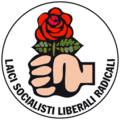
 2008 (not used in elections)
2008 (not used in elections)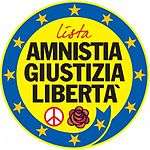
 2017–present
2017–present
See also
References
- ↑ (in Italian) http://www.radicali.it
- 1 2 James L. Newell (2010). The Politics of Italy: Governance in a Normal Country. Cambridge University Press. pp. 42, 218, 219. ISBN 978-0-521-84070-5.
- ↑ Raphaël Kies (2010). Promises and Limits of Web-deliberation. Palgrave Macmillan. p. 117. ISBN 978-0-230-10637-6.
- ↑ John Pinder (1989). "Il federalismo in Gran Bretagna e in Italia: i radicali e la tradizione liberale inglese". The Federalist.eu. line feed character in
|title=at position 45 (help) - ↑ Valerio Federico (29 October 2017). "Federalismo, Federico: Stati nazione hanno fallito, serve nuovo modello di federalismo europeo e municipale". radicali.it.
- ↑ Nicola Barone (1 November 2017). "Dai Radicali sì a lista aperta per il rilancio del federalismo europeo". Il Sole 24 Ore.
- ↑ "ALDE Party members - ALDE Party". 30 November 2012.
- ↑ "Radicali Italiani - Italy - Full Members - Members - Liberalism".
- ↑ "Statuto - Radicali Italiani".
- ↑ André Krouwel (2012). Party Transformations in European Democracies. SUNY Press. p. 326. ISBN 978-1-4384-4483-3.
- ↑ http://www.ilriformista.it/news/rif_lay_notizia_01.php?id_cat=4&id_news=3003 Archived October 11, 2007, at the Wayback Machine.
- ↑ vasco_pirri_ardizzone. "http://blog.panorama.it/italia/2007/11/02/radicali-a-congresso-di-qua-o-di-la-la-priorita-sono-le-riforme-economiche/". Blog.panorama.it. Retrieved 2011-02-24. External link in
|title=(help) - ↑ Italia, AGI - Agenzia Giornalistica. "Ultime Notizie Online - Agenzia Giornalistica Italia - AGI". Agi.
- ↑ "7° CONGRESSO RADICALE: SCINTILLE A CONGRESSO, MA CASU RESTA SEGRETARIA - Clandestinoweb: sondaggi politici, elettorali. Il sondaggio politico elettorale che fa opinione". Clandestinoweb. Retrieved 2011-02-24.
- ↑ "Radicali italiani a congresso Staderini nuovo segretario - Politica". Repubblica.it. 2009-11-15. Retrieved 2011-02-24.
- ↑ ELEZIONI, MARCO PANNELLA PRESENTA IL SIMBOLO DELLA LISTA AMNISTIA, GIUSTIZIA E LIBERTA’ – FOTO | Data 24 News | Sondaggio | Media | Politica Archived 2013-01-07 at the Wayback Machine.
- ↑ "Pagina non Trovata". www.ilmessaggero.it.
- ↑ "Dipartimento per gli Affari Interni e Territoriali". elezioni.interno.it.
- ↑ "Dipartimento per gli Affari Interni e Territoriali". elezioni.interno.it.
- ↑ "XII Congresso di Radicali italiani – "Riconquistare giustizia, democrazia, legalità. Quali lotte, quali mezzi, quale soggetto politico?" - Radicali Italiani". 8 November 2013.
- ↑ "Archived copy". Archived from the original on 2016-03-04. Retrieved 2015-11-02.
- ↑ "Radicali, Magi eletto nuovo segretario «Alle prossime amministrative ci saremo»".
- ↑ http://ilmanifesto.info/magi-e-segretario-ma-pannella-sgradisce-lui-non-e-il-nuovo/
- ↑ "Se Pannella non convince i Radicali - Formiche.net". 3 November 2015.
- ↑ "Radicali in campo a Roma e Milanocon nuovo simbolo (e senza Pannella)".
- ↑ "Cosa succede tra i Radicali su Roberto Giachetti e Marco Cappato - Formiche.net". 4 April 2016.
- ↑ "Comune di Roma - Lazio - Elezioni Comunali - Risultati - Ballottaggio - 5 giugno 2016".
- ↑ "Comune di Milano - Lombardia - Elezioni Comunali - Risultati - Ballottaggio - 5 giugno 2016".
- ↑ "Morto Marco Pannella, il leader radicale si è spento a 86 anniRenzi: «Addio a leone della libertà»Il webreportage-A casa di Marco: foto".
- ↑ "E' morto Marco Pannella. Aveva 86 anni. Bonino: "Non ha mai avuto i riconoscimenti adeguati"". 19 May 2016.
- ↑ "Come discutono e si dividono i Radicali - Formiche.net". 26 April 2016.
- ↑ "E i Radicali rischiano la scissione".
- ↑ "MOZIONE GENERALE DEL 40ESIMO CONGRESSO STRAORDINARIO DEL PARTITO RADICALE NONVIOLENTO, TRANSNAZIONALE E TRANSPARTITO".
- ↑ "I furbetti del partitino (consulenza per i compagni espulsi o in via di espulsione)".
- ↑ "Radicali, al congresso vincono gli 'ortodossi'. Turco: "Tremila tesserati nel 2017 o il partito va in liquidazione"". 3 September 2016.
- ↑ "Congresso Partito radicale, vincono gli ultrà pannelliani".
- ↑ "Archived copy". Archived from the original on 2016-11-04. Retrieved 2016-11-04.
- ↑ "Cosa si è detto davvero al congresso dei Radicali Italiani - Formiche.net". 2 November 2016.
- ↑ "I mezzi prefigurano i fini. Alle iscritte ed iscritti, a chi è già stato iscritto e a chi si iscriverà al Partito Radicale Nonviolento Transnazionale Transpartito del 2017".
- ↑ Trocino, Alessandro. "Radicali, la rottura definitiva Bonino e Magi cacciati dalla sede".
- ↑ "Lite con sfratto tra Radicali, Bonino: "Resta casa mia". Contesa economica dietro le divergenze".
- ↑ "I radicali sfrattano Bonino, l'ultima faida del dopo Pannella". 11 February 2017.
- ↑ "Il Partito radicale sfratta l'associazione di Emma Bonino: via dalla sede del partito". 11 February 2017.
- ↑ "I radicali alle elezioni da soli: la nuova lista si chiamerà "+ Europa"".
- ↑ "Bonino vara +Europa e lascia la porta aperta al Pd. Ma sulle firme è "missione impossibile" (di C. Paudice)". 23 November 2017.
- ↑ "Centro-sinistra, il duello sulle priorità".
- ↑ "Statuto". radicali.it. 1 November 2017.
- ↑ Lanfranco Palazzolo (21 March 2017). "Pannella e Cattaneo: servizio sulla presentazione di "Interdizioni israelitiche" di Carlo Cattaneo, interviste a Gianmarco Pondrano Altavilla e a Samuele Crosetti". Radio Radicale.
- ↑ Pier Paolo Segneri (2012). "Ripartire da Mazzini per gli Stati Uniti d'Europa". radicali.it.
- ↑ Pier Paolo Segneri (2012). "Del perché i Radicali devono tanto a Salvemini". radicali.it.
- ↑ Cristiana Pugliese (22 September 2014). "Il prossimo convegno dei Radicali su Benedetto Croce ed Ignazio Silone: collegamento con Rita Bernardini". Radio Radicale.
- ↑ Roberto Davide Papini (9 February 2017). "Radicali, omaggio a Ernesto Rossi. Bernardini: "Il suo pensiero è sempre attuale"". La Nazione.
- ↑ "Gandhi, M.L. King, Popper, Kant". radicalparty.org.
- ↑ "L'unico programma politico sottoposto al voto dei cittadini". radicali.it. 2005.
- ↑ "Marco Pannella, sciopero fame come arma politica: il più lungo nel 2011". adnkronos. 19 May 2016.
- ↑ Manuela Perrone (19 May 2016). "Pannella, cinquant'anni di battaglie per i diritti". Il Sole 24 Ore.
- ↑ "Incontro con il "Gandhi" italiano". La Stampa. 22 June 1968.
- ↑ Claudio Landi (20 November 2017). "La figura di John Maynard Keynes. Interviste a Giorgio La Malfa e Natale D'Amico". Radio Radicale.
- ↑ Guido Salerno Aletta (21 May 2016). "Marco Pannella era un liberale e non un turbo liberista". formiche.net.
- ↑ Federico Parodi (28 September 2017). "Testamento biologico, i Radicali rilanciano: notaio gratuito per chi vuole autenticare il documento". la Repubblica.
- ↑ Leonardo Monaco (31 May 2017). "Prostituzione: una legge per dei lavoratori come altri". radicali.it.
- ↑ Patrizia De Rubertis (30 August 2016). "Radicali, la legalizzazione delle droghe leggere spiegata in cartone animato". il Fatto Quotidiano.
- ↑ "Droghe leggere, i radicali: al via le firme per la legalizzazione". il Messaggero. 21 April 2016.
- ↑ "Ero straniero - L'umanità che fa bene". radicali.it. 28 October 2017.
- ↑ Susanna Turco (20 January 2017). "Immigrazione, la nuova sfida di Emma Bonino è mandare al macero la Bossi-Fini". l'Espresso.
- ↑ "configgere la grande bugia e cambiare il racconto sull'immigrazione". radicali.it.
- ↑ Mario Standerini (17 May 2006). "I mercanti nel Tempio". Notizie Radicali.
- ↑ Luca Viscardi. "Pannella, Terzani, Eisenhower e la nonviolenza". radicali.it.
- ↑ "Sintesi dell'intervento di Marco Pannella alla Conferenza stampa "Israele nell'Unione europea"". radicalparty.org. 17 June 2002.
- ↑ Rosario Scognamiglio (19 July 2014). "Israele e Palestina: Una Guerra Metafisica". radicali.it.
- ↑ Giulio Meotti (20 May 2016). "Pannella nella frontiera più estrema d'europa: Israele". Il Foglio.
- ↑ Simone Sapienza (16 July 2014). "E se palestinesi e israeliani entrassero in Europa?". radicali.it.
External links
- Official website
- Transnational Radical Party
- Associazione Luca Coscioni
- Radio Radicale
- Quaderni radicali